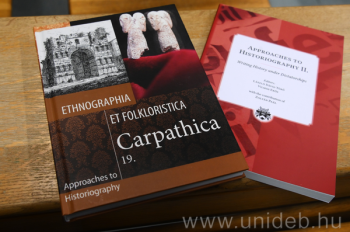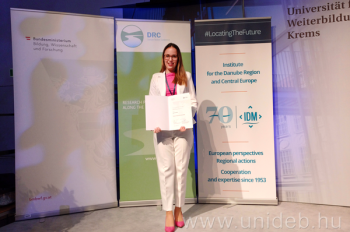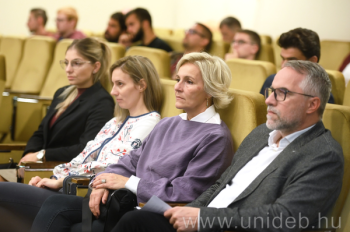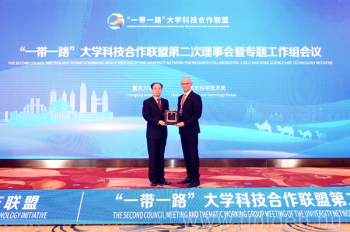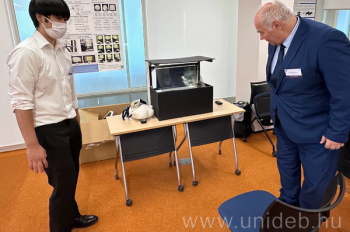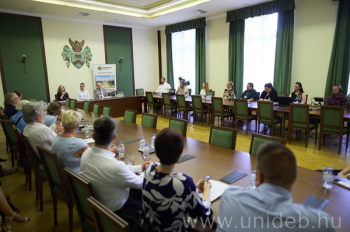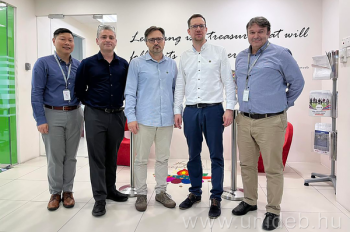The latest research results in the field of historiography were presented by experts at the 3rd International Historiography Conference, organised by the Institute of History of the Faculty of Humanities of the University of Debrecen (DE) between 21-23 November. The three-day international conference was also the occasion for the presentation of a monograph on István Szabó, an outstanding Debrecen historian.
Hírek Research címkével
It was an assistant professor of the Department of Molecular and Nanopharmaceutics at the Faculty of Pharmacy of the University of Debrecen who became the recipient of the prize named Danubius Young Scientist Award 2024 from Hungary. Ágnes Rusznyák's chief research interests include the cellular effects of cyclodextrins and RNA carrier activity. Her findings have been published in several scientific journals.
The necessity of biodiversity monitoring, modern data collection methods, the socio-economic use of information obtained through monitoring, the launch of the environmental monitoring system of the University of Debrecen and the current phases of the work were also discussed at the 1st Biodiversity Conference.
The University of Debrecen is the only Hungarian institution of higher education that has become a member of a partner university network of the Belt and Road Initiative (BRI), called University Network for Research Collaboration. This year's presidential forum and conference of this network, which brought together 15 institutions from 11 countries worldwide with the aim to promote sustainable development globally, was held in Chongqing, where Vice Rector Károly Pető officially received a membership plaque.
Three faculties, the Faculty of Engineering, the Faculty of Informatics and the Faculty of Humanities, of the University of Debrecen were represented at a conference called CogInfoCom (Cognitive infocommunications) at Chuo University, Japan, which was attended by academics from universities located on several continents. This event primarily focused on the potential of merging human and digital environments, artificial intelligence, info-communication and cognitive skills.
Saigas and Asian mouflons, i.e. argali sheep, are the focal point of the most recent joint project of Evolutionary Genomics Research Group at the Department of Botany of the Faculty of Science and Technology at the University of Debrecen and the Institute of Biology of the Mongolian Academy of Sciences (MAS). The new Hungarian-Mongolian research project is supported by a mobility grant from MTA [HAS: Hungarian Academy of Sciences].
Researchers affiliated with universities in countries like the United States, Belgium, Cuba, Poland, San Marino and Hungary gave papers on the background and global impact of the 1924 US Immigration Act as well as on key issues of migration at the University of Debrecen (UD). The international “hybrid” conference, titled Johnson-Reed 100 Years Later, was organized on August 22 and 23 by the Institute of English and American Studies of the Faculty of Humanities (FoH) at UD in cooperation with the American Hungarian Educators Association.
The first stage of the project launched to research the history and heritage of the Hungarian community of Montreal was completed successfully, its results and next steps were presented in mid-June at Concordia University jointly by the Faculty of Humanities of the University of Debrecen and the staff of the Consulate General of Hungary in Montreal.
The Faculty of Humanities at the University of Debrecen and Sunway University in Malaysia are to expand their bilateral cooperation through a new joint research and academic programme. Faculty members from the two institutions are currently processing material on the trip to Borneo by János Xántus in 1870, documenting the experiences of the famous Hungarian traveller and naturalist in two volumes both in English and Hungarian.
A paper on the evolution and genetic architecture of a polymorphism restricted to cuckoo eggs has been published in the prestigious journal Science Advances. Several scientists from the University of Debrecen have been involved in the work since 2020.
